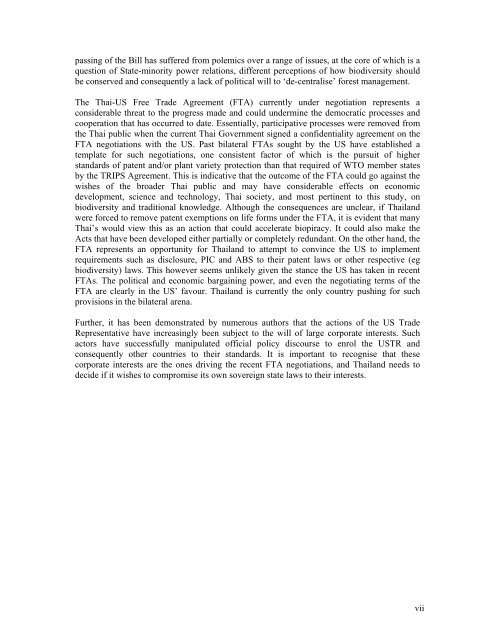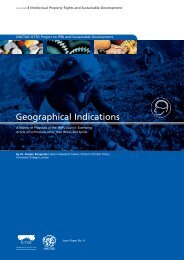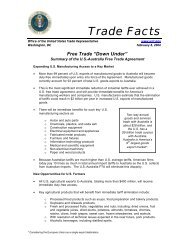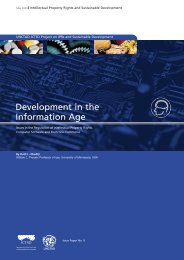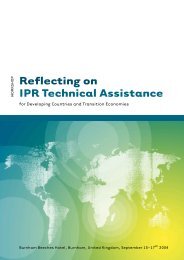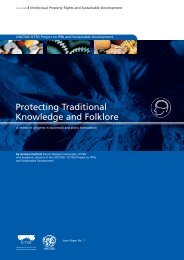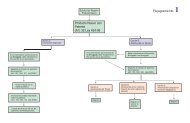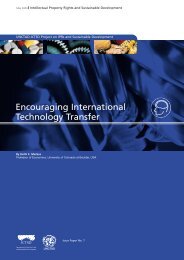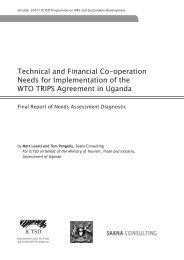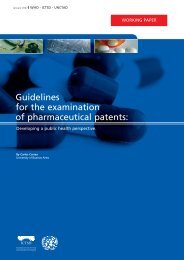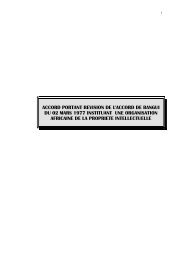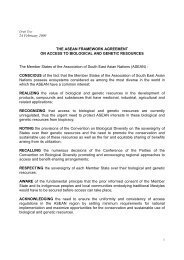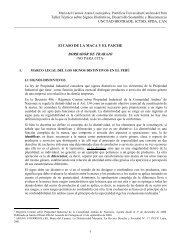Governance and Micropolitics of Traditional ... - IPRsonline.org
Governance and Micropolitics of Traditional ... - IPRsonline.org
Governance and Micropolitics of Traditional ... - IPRsonline.org
Create successful ePaper yourself
Turn your PDF publications into a flip-book with our unique Google optimized e-Paper software.
passing <strong>of</strong> the Bill has suffered from polemics over a range <strong>of</strong> issues, at the core <strong>of</strong> which is a<br />
question <strong>of</strong> State-minority power relations, different perceptions <strong>of</strong> how biodiversity should<br />
be conserved <strong>and</strong> consequently a lack <strong>of</strong> political will to ‘de-centralise’ forest management.<br />
The Thai-US Free Trade Agreement (FTA) currently under negotiation represents a<br />
considerable threat to the progress made <strong>and</strong> could undermine the democratic processes <strong>and</strong><br />
cooperation that has occurred to date. Essentially, participative processes were removed from<br />
the Thai public when the current Thai Government signed a confidentiality agreement on the<br />
FTA negotiations with the US. Past bilateral FTAs sought by the US have established a<br />
template for such negotiations, one consistent factor <strong>of</strong> which is the pursuit <strong>of</strong> higher<br />
st<strong>and</strong>ards <strong>of</strong> patent <strong>and</strong>/or plant variety protection than that required <strong>of</strong> WTO member states<br />
by the TRIPS Agreement. This is indicative that the outcome <strong>of</strong> the FTA could go against the<br />
wishes <strong>of</strong> the broader Thai public <strong>and</strong> may have considerable effects on economic<br />
development, science <strong>and</strong> technology, Thai society, <strong>and</strong> most pertinent to this study, on<br />
biodiversity <strong>and</strong> traditional knowledge. Although the consequences are unclear, if Thail<strong>and</strong><br />
were forced to remove patent exemptions on life forms under the FTA, it is evident that many<br />
Thai’s would view this as an action that could accelerate biopiracy. It could also make the<br />
Acts that have been developed either partially or completely redundant. On the other h<strong>and</strong>, the<br />
FTA represents an opportunity for Thail<strong>and</strong> to attempt to convince the US to implement<br />
requirements such as disclosure, PIC <strong>and</strong> ABS to their patent laws or other respective (eg<br />
biodiversity) laws. This however seems unlikely given the stance the US has taken in recent<br />
FTAs. The political <strong>and</strong> economic bargaining power, <strong>and</strong> even the negotiating terms <strong>of</strong> the<br />
FTA are clearly in the US’ favour. Thail<strong>and</strong> is currently the only country pushing for such<br />
provisions in the bilateral arena.<br />
Further, it has been demonstrated by numerous authors that the actions <strong>of</strong> the US Trade<br />
Representative have increasingly been subject to the will <strong>of</strong> large corporate interests. Such<br />
actors have successfully manipulated <strong>of</strong>ficial policy discourse to enrol the USTR <strong>and</strong><br />
consequently other countries to their st<strong>and</strong>ards. It is important to recognise that these<br />
corporate interests are the ones driving the recent FTA negotiations, <strong>and</strong> Thail<strong>and</strong> needs to<br />
decide if it wishes to compromise its own sovereign state laws to their interests.<br />
vii


